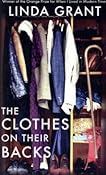The Clothes On Their Backs by Linda Grant
 The Clothes on Their Backs by Linda Grant
The Clothes on Their Backs by Linda Grant
My rating: 4 of 5 stars
Near the ending of the book, Miranda tells us “The clothes you wear are a metamorphosis. They change you from the outside in.”
All throughout the book The Clothes On Their Backs, clothes play a big part in the story of Miranda, daughter of Hungarian Jewish immigrants, and, specifically, niece of the notorious slum lord of 60s London, Sándor Kovacs.
This was the time of English punk music and fashion. Unfortunately for Miranda she was stuck with a headful of corkscrews and hair above her lip. Still, she managed to get married to an blond upper-class Englishman, Alexander, from her university. But, as her luck would have it, she returned home after their honeymoon, to her parent’s Benson Court apartment, sans husband. He had died there unexpectedly, from a “ghastly accident”. Later, when she took up with another Englishman, this time from the lower ranks, who work in the railways, she revealed that she had been then with child and had an abortion.
As per usual with those times, in the 60s, disaffected young people like her dressed like punks. But she was distinguished from those, like her, who pierced their bodies and wore their hair in spikes and in high colours, and from others who shaved their heads and wore laced-up leather boots, who hated anybody who were not white. They were the skinheads, who menaced Eunice, the black girlfriend of Miranda’s uncle, Sándor.
Most of the book tells of Sándor’s life story, which he recorded, into tapes, for Miranda to transcribe into an autobiography. While Miranda was under his employ, she was known to Sándor as Vivien, when they met in park. Sándor would recount to her how he had been wrongly sent to prison for abusing his tenants, and for being a pimp.
Peppered within Sándor’s tales are people like Eunice, with whom he fell in love, his estranged brother, Miranda’s father, Miranda’s mother, and Claude the tenant whose throat he nearly slashed after Miranda had a row with him.
The ending is very apropos to the clothes theme. It’s thirty years since Sándor’s death, after his arrest for slicing Claude. Miranda was collecting the tapes and notebooks about Sándor’s life and passing them to Eunice, who now sold clothes in a shop. They had tea together, and she left, seeing her for the last time, with a new dress: “A new dress. Is that all it takes to make a new beginning, this shred of dyed cloth, shaped into the form of a woman’s body? Our vulnerability suddenly touched me, all our terrible, moving weaknesses contained in a jacket, a skirt, a pair of shoes.”
Linda Grant writes, intelligently, and empathetically, about how we all want to take on a better semblance (Miranda spoke with a posh accent, a consequence of university), a better life (Jewish immigrants, like Sándor and Miranda’s parents, and Eunice, rise above poverty and prejudice).
View all my reviews >>
The ending is very apropos to the clothes theme. It’s thirty years since Sándor’s death, after his arrest for slicing Claude. Miranda was collecting the tapes and notebooks about Sándor’s life and passing them to Eunice, who now sold clothes in a shop. They had tea together, and she left, seeing her for the last time, with a new dress: “A new dress. Is that all it takes to make a new beginning, this shred of dyed cloth, shaped into the form of a woman’s body? Our vulnerability suddenly touched me, all our terrible, moving weaknesses contained in a jacket, a skirt, a pair of shoes.”
Linda Grant writes, intelligently, and empathetically, about how we all want to take on a better semblance (Miranda spoke with a posh accent, a consequence of university), a better life (Jewish immigrants, like Sándor and Miranda’s parents, and Eunice, rise above poverty and prejudice).
View all my reviews >>






















was very disappointed in this book as a choice for the booker shortlist. it isn't a bad book but it really doesn't stand out from the crowd for me. it felt dated and not terribly relevant. i got to the end and thought "yeah, well so what?"
and what do you reckon to the husband getting snuffed out in such a ridiculous way on the honeymoon? all suspension of belief withered away.
i liked Eunice but didn't feel much for the other characters. i wish there had been more on clothes.
Leon Wing says
Thanks for responding, Sharon (haven't seen each other for a bit, hvn't we? must make it soon, shdn't we?)
Yes, I agree with you on the ridiculous way her Alexander died during their honeymoon: that's why I quoted "ghastly accident", a bit tongue in cheek, like.
bibliobibuli says
miss you Leon!! yes we must meet up soon.
Leon Wing says
Yes, we must!!!